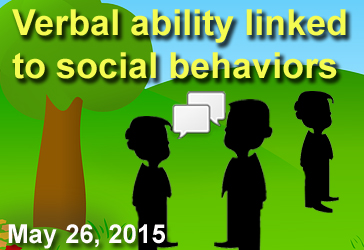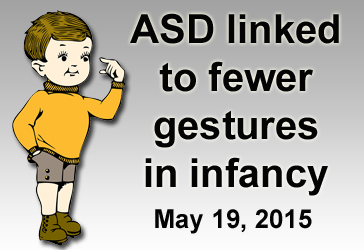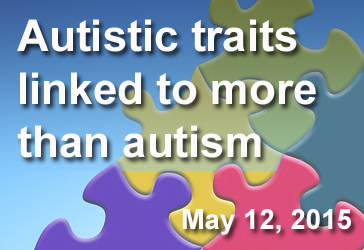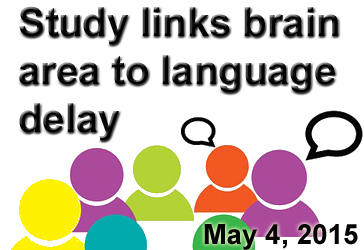Archives
May, 2015
Select a different month in the archive
Study Probes Children’s Language Outcomes in Autism
By Chelsea E. Toledo, M.A. on May 26, 2015

Background: According to the National Institutes of Health, as many as 30 percent of children with Autism Spectrum Disorder (ASD) may never develop functional language abilities. However, little research has explored the factors contributing to those children’s verbal deficits.
What’s New: The January 2015 issue of the Journal of Child Psychology and Psychiatry included a study probing the relationship between language acquisition and the severity of symptoms in children with ASD. The researchers assessed the behavior and social abilities of 70 children between the ages of 1 and 5 with ASD, using established observational screenings upon admission into the study, and then again when the child was five years old. They found that, of the 47 children who could not say more than one word at the time of the first observation, only 36 percent (17 children) could utter phrases by the time of the second observation. Minimal verbal ability was linked to the changes in the severity of the children’s social symptoms, but not to repeated behaviors.
Why it’s important: This study adds to research suggesting that a significant portion of children with ASD remain minimally verbal by age 5. Future research over longer periods of time could reveal the precise relationship between the severity of autism symptoms and language acquisition.
Help me understand :
| Source(s) : |
| Tweet |
ASD Linked to Fewer Gestures in Infancy
By Chelsea E. Toledo, M.A. on May 19, 2015

Background: One of the trademark symptoms of Autism Spectrum Disorder (ASD) is impaired communication, which is accompanied by difficulty with social interaction and restrictive, repetitive behaviors. Although ASD is typically not diagnosed until later in childhood, language delay can present itself as early as the first year of life.
What’s New: The January 2015 issue of the Journal of Autism and Developmental Disorders included a study examining the relationship between language production and the gesture use by infants and their caretakers earlier in life. The researchers performed observational screenings on a total of 75 infants—48 who had a sibling with ASD and 27 who did not. During observation, the researchers evaluated maternal and infant gestures at 12 months of age and the children’s subsequent language production at 18 months of age.
The research team found that the infants who later fit the ASD profile produced the fewest gestures, and that the use of gestures by mothers only affected the language production of the infants who did not fit the ASD profile. They also observed that mothers of the infants deemed high-risk for ASD by virtue of having a sibling with the disorder tended to produce more gestures, such as pointing and nodding when interacting with their children.
Why it’s important: This study reinforces other research suggesting a delay in gesture production in infants who would ultimately receive an ASD diagnosis. Future research could illuminate intervention strategies based on interactive gesturing by caretakers.
Help me understand :
| Source(s) : |
| Tweet |
Study Links Autistic Traits to Adult Disorders
By Chelsea E. Toledo, M.A. on May 12, 2015

Background: Autism Spectrum Disorder (ASD) presents itself as differences in communication, social interaction, and behavior. Research has shown that these traits often appear in children with psychiatric conditions such as depression and bipolar disorder. However, fewer studies have evaluated whether adults affected by psychiatric disorders also exhibit autistic-like traits.
What’s New: On April 2, 2015, the online journal PLOS ONE published a study exploring the prevalence of autistic-like traits in adults with psychiatric disorders. The researchers applied a series of established psychological and behavioral screenings to a total of 290 individuals between the ages of 25 and 59—125 with clinical depression, 56 with bipolar disorder, 44 with schizophrenia, and 65 with no psychiatric diagnosis. They found that a significant portion of the individuals with psychiatric disorders—with the exception of depression in remission—exhibited autistic-like traits like restrictive, repetitive behaviors. The prevalence of these ranged from 46 percent in those with ongoing depression to 61 percent in those with schizophrenia—as compared to the 14 percent of individuals with no psychiatric diagnosis who demonstrated autistic-like traits.
Why it’s important: This is the first major study to examine the link between adult psychiatric conditions and the traits observed in ASD. Because those traits were so strongly associated with adult bipolar disorder and schizophrenia, the findings could inform screening and treatment for those patient populations.
Help me understand :
| Source(s) : |
| Tweet |
Study Links Brain Differences to Language Delay
By Chelsea E. Toledo, M.A. on May 4, 2015

Background: Autism Spectrum Disorder (ASD) varies widely in its presentation. While some individuals on the spectrum have no history of language delay, others experience extreme differences in behavior, social skills, and communication compared to peers. Several studies have addressed the brain differences between individuals with ASD and those with typical development, but little research has focused on how brain development might differ for those with varying presentations of the disorder.
What’s new: On March 3, 2015, the journal Autism Research published a study exploring brain differences in adults with ASD to determine whether those who had experienced language delay were neurologically different from those who had not. Every participant had an IQ in the normal range. The researchers found that the 27 individuals who had experienced language delay had thinner layers in a specific brain region than the 37 individuals with typical language development. The thickness of that brain region, commonly associated with cognition, correlated with higher verbal IQ scores.
Why it’s important: This is the first study to link verbal IQ to differences in specific regions of the brain’s outer layers. This work could help researchers understand the underlying factors leading to the variation in different cases of ASD.
Help me understand :
| Source(s) : |
| Tweet |

